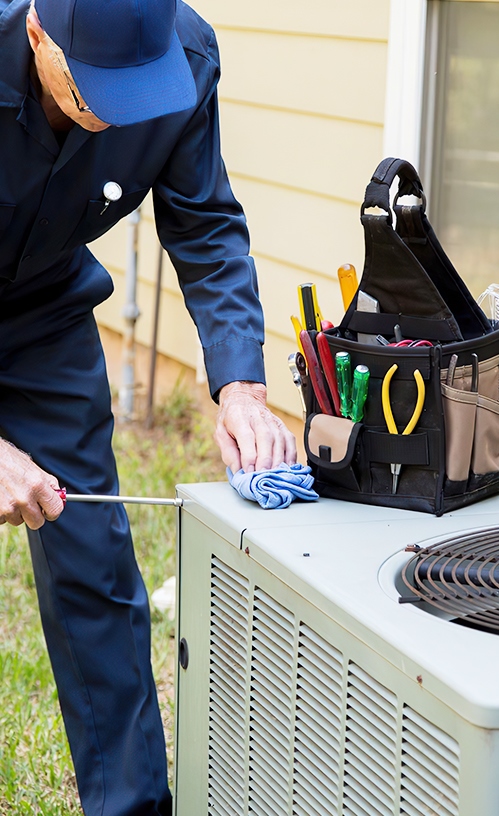When To Replace AC System
The air conditioning system is essential to any home or business, especially in hot climates. Over time, AC systems can become less efficient or stop working. Knowing when to replace your AC system is important to avoid uncomfortable living conditions, high energy bills, and costly repairs. In this context, there are several signs indicate it may be time to replace your AC system.
Age of the System
The age of your AC system is an important factor in determining whether it needs to be replaced. Most AC systems have a lifespan of 10-15 years, after which they can become less efficient and require frequent repairs. If your system is approaching or exceeding its expected lifespan, it may be time to consider replacing it.
Even if your AC system appears to be working fine, it may be worth replacing if it is older than 10-15 years old. Newer AC systems are typically more energy-efficient, which can lead to lower energy bills and a reduced carbon footprint. Additionally, newer systems often have more advanced features and technology, such as programmable thermostats and smart controls, making your home or business more comfortable and easier to manage.
If you are unsure about the age of your AC system, you can check the manufacturer’s label on the unit or consult a licensed HVAC technician who can help you determine its age and condition.
Even if your AC system appears to be working fine, it may be worth replacing if it is older than 10-15 years old. Newer AC systems are typically more energy-efficient, which can lead to lower energy bills and a reduced carbon footprint. Additionally, newer systems often have more advanced features and technology, such as programmable thermostats and smart controls, making your home or business more comfortable and easier to manage.
If you are unsure about the age of your AC system, you can check the manufacturer’s label on the unit or consult a licensed HVAC technician who can help you determine its age and condition.

Strange Noises or Smells
If you notice strange noises or smells coming from your AC system, it may be a sign of a serious problem. Here are some examples of noises and smells that could indicate an issue with your AC system:
- Loud, banging noises may indicate a problem with the blower motor or the compressor.
- Hissing noises may indicate a refrigerant leak, harming your health and the environment.
- Musty or moldy smells: This may indicate a problem with moisture or mold growth in your AC system or ductwork, which can lead to health problems.
- Burning smells may indicate an electrical problem, such as a faulty motor or wiring, which can be a fire hazard.
- Chemical or rotten egg smells: This may indicate a gas leak, which can be dangerous and requires immediate attention.

If you notice any of these noises or smells, it is important to turn off your AC system immediately and contact a licensed HVAC technician for inspection and repair. In some cases, it may be more cost-effective to replace your AC system, especially if it is an older system that requires frequent repairs.
Uneven Cooling
Uneven cooling is a common sign that your AC system may not work correctly. If some parts of your home or business are cooler than others, it could indicate several issues, including clogged air filters, leaky ductwork, or a malfunctioning thermostat.
For instance, clogged air filters can restrict the airflow in your AC system, causing some parts of your space to be cooler than others. Leaky ductwork can also cause uneven cooling, as air may escape through holes or gaps in the ducts before it reaches all parts of your space. A malfunctioning thermostat can also lead to uneven cooling, as it may not accurately measure the temperature in your space and adjust the system accordingly.
If you notice uneven cooling in your space, it is important to have your AC system inspected by a licensed HVAC technician. The technician can identify the underlying cause of the issue and recommend the best course of action, which may include repairing or replacing your AC system.
In some cases, replacing your AC system may be the most cost-effective solution, especially if it is an older system that requires frequent repairs or can no longer provide adequate cooling for your space. A new, properly sized AC system can provide even more cooling throughout your home or business and reduce energy bills in the long run.
For instance, clogged air filters can restrict the airflow in your AC system, causing some parts of your space to be cooler than others. Leaky ductwork can also cause uneven cooling, as air may escape through holes or gaps in the ducts before it reaches all parts of your space. A malfunctioning thermostat can also lead to uneven cooling, as it may not accurately measure the temperature in your space and adjust the system accordingly.
If you notice uneven cooling in your space, it is important to have your AC system inspected by a licensed HVAC technician. The technician can identify the underlying cause of the issue and recommend the best course of action, which may include repairing or replacing your AC system.
In some cases, replacing your AC system may be the most cost-effective solution, especially if it is an older system that requires frequent repairs or can no longer provide adequate cooling for your space. A new, properly sized AC system can provide even more cooling throughout your home or business and reduce energy bills in the long run.
High Energy Bills
If you notice that your energy bills have been steadily increasing, your AC system may be a contributing factor. Older AC systems are less energy-efficient than newer ones, which consume more energy to cool your home or business. This increased energy usage can lead to higher energy bills.
In addition to an older system, other factors contributing to high energy bills include clogged air filters, leaky ductwork, or a system that is too small or too large for your space. It’s important to have your AC system inspected regularly by a licensed HVAC technician to ensure it runs at peak efficiency.
If your AC system is older or you suspect it may contribute to high energy bills, it may be time to consider replacing it with a newer, more energy-efficient system. This can reduce your energy bills and improve the overall comfort of your home or business. Look for an Energy Star-certified system that meets the highest standards for energy efficiency set by the US Environmental Protection Agency.
In addition to an older system, other factors contributing to high energy bills include clogged air filters, leaky ductwork, or a system that is too small or too large for your space. It’s important to have your AC system inspected regularly by a licensed HVAC technician to ensure it runs at peak efficiency.
If your AC system is older or you suspect it may contribute to high energy bills, it may be time to consider replacing it with a newer, more energy-efficient system. This can reduce your energy bills and improve the overall comfort of your home or business. Look for an Energy Star-certified system that meets the highest standards for energy efficiency set by the US Environmental Protection Agency.

Leaks
Leaks in an AC system can be a serious problem that requires immediate attention. Common signs of a leak include reduced cooling performance, increased energy bills, and water or refrigerant around the unit.
If you suspect your AC system leaks, it is important to turn off the system and contact a licensed HVAC technician for inspection and repair. Leaks can occur in various parts of the AC system, including refrigerant lines, coils, and compressors. A technician can locate the leak and repair or replace the affected component.
In some cases, replacing the entire AC system may be more cost-effective than repairing a leak, especially if the system is older or has other underlying issues. A licensed technician can guide the best action based on your specific situation and budget.
In conclusion, if your AC system shows the signs above, it may be time to consider replacing it with a newer, more efficient one. Regular maintenance and inspections can help prevent these issues and prolong the lifespan of your AC system. If you need help with AC replacement or maintenance, contact us at Strickland. We are a trusted HVAC company with experience and expertise in AC systems.
If you suspect your AC system leaks, it is important to turn off the system and contact a licensed HVAC technician for inspection and repair. Leaks can occur in various parts of the AC system, including refrigerant lines, coils, and compressors. A technician can locate the leak and repair or replace the affected component.
In some cases, replacing the entire AC system may be more cost-effective than repairing a leak, especially if the system is older or has other underlying issues. A licensed technician can guide the best action based on your specific situation and budget.
In conclusion, if your AC system shows the signs above, it may be time to consider replacing it with a newer, more efficient one. Regular maintenance and inspections can help prevent these issues and prolong the lifespan of your AC system. If you need help with AC replacement or maintenance, contact us at Strickland. We are a trusted HVAC company with experience and expertise in AC systems.

